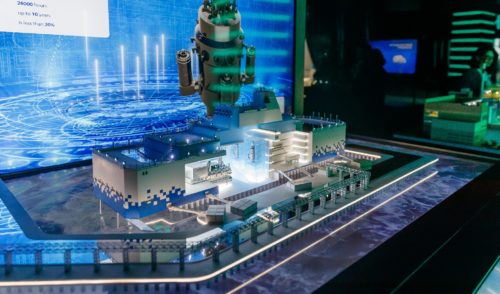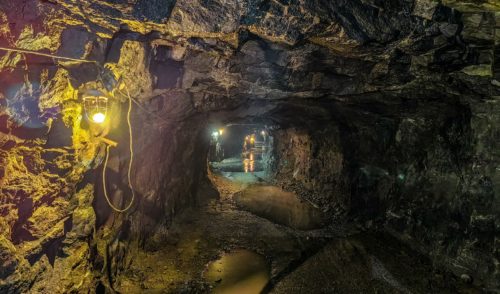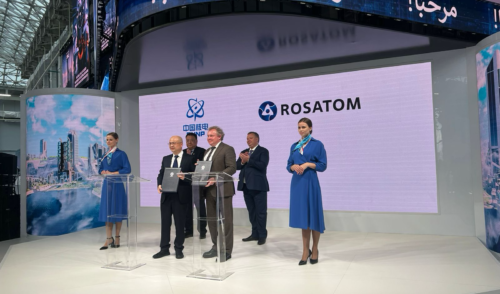
Just-in-time procurement
back to contentsThe forum ATOMEX was opened by CEO of ROSATOM Sergey Kirienko. He noted the role of the event in improvement of the procurement system in the nuclear industry: “The forum allows us getting an exact idea of what we have to do to further improve the procurement activities and build up a transparent and efficient system of interaction with the organizations interested in supplying their products to nuclear sector enterprises.”
In his address, Kirienko elaborated on key challenges the nuclear industry and its suppliers are facing. The first and major challenge is the task of shortening the NPP construction time and the procurement process time. “Previously, we did not make time a priority, but now this is one of the basic indicators of the sector development and of improvement of its competitiveness in the global market,” Sergey Kirienko said.
Key indicators are different for different divisions of ROSATOM. In the machine engineering division they deal with the reactor vessel and steam generators manufacturing cycle, in the construction division these are timeframes of the construction and installation, in the fuel division it is the period between the order receipt and fuel supply. On the whole, the manufacturing time and prime cost of the products are to be reduced by 30% over 3 years. “In other words, everywhere we seek to reduce time of the process with unconditional observance of the quality and safety requirements,” Kirienko concluded.
A compliment from rivals
ROSATOM needs a large overseas orders portfolio for the long-term development. This issue has become especially acute in the light of the political pressure on our country. Sergey Kirienko reproached some foreign players for unfair competition and building artificial constraints for participation of Russians in nuclear build abroad. “But we take such things as a compliment. If large foreign companies can win only hiding behind a screen of the complex political situation, this is acknowledgment of our high competitiveness in open, fair fight,” the head of sector thinks.
Sergey Kirienko reproached some foreign players for unfair competition and building artificial constraints for participation of Russians in nuclear build abroad. “But we take such things as a compliment. If large foreign companies can win only hiding behind a screen of the complex political situation, this is acknowledgment of our high competitiveness in open, fair fight,” the head of sector thinks.
ROSATOM wins tenders because it offers referenced technologies at a competitive price. However, today we should be “not 2% but 10-15%” ahead of the competitors, the head of ROSATOM is certain. The customer’s interest has moved to the cost of kilowatt-hour of generated electricity, though the final cost of construction was considered the priority not long ago. “Don’t be surprised that in the procurement we more often will be interested not only in the cost of supply but also the cost of lifecycle. We don’t need a cheap product, which will turn to bring about a costly kilowatt-hour,” Kirienko specified.
A unit within six years
The customers are interested also in time, which passes from the signing of the NPP construction contract till its commissioning and connection to the grid. If the cost of the plant construction is calculated based on the cost of kilowatt-hour, the construction duration is of crucial importance. One has to fit within a timeframe, which is not longer than six years.
The CEO of ROSATOM believes that to build within six years one has to reconsider the design time and hold tenders on the critical equipment before or in parallel with the design stage. “The project development along with licensing can take up to two years. And in tenders we want to take account of specific characteristics of the equipment,” Kirienko says. He is certain that such approach will help building long-term relations with suppliers.
Owing to the development of the categorical procurement system, small product volumes are merged in a common sectoral order. “A number of vendors who didn’t see the sense to bid for the sake of dozens of tons but who interested in orders for thousands of tons are growing by many times in our case. We come to a price reduction and large predictable order for long term,” the head of ROSATOM says. This approach has led up to a 30% reduction in price and to 40% reduction in a number of procurement procedures. “We will move further following this logic,” Sergey Kirienko promised.
Openness is the key to effectiveness
The forum’s business program included round-table sessions “Opportunities of nuclear industry suppliers. Arrangement of procurement activities”, “Construction, engineering and information technologies during NPP construction”, “Information technologies during NPP construction” and other. The forum participants were able not only to discuss most topical issues of ROSATOM’s procurement activities but also provided their proposals on its further improvement.
Over 40 companies (enterprises of ROSATOM and its subsidiary entities, equipment and service vendors) presented their expositions on the exhibition held in the framework of the forum. More than 20 vendor-companies had an opportunity of displaying their products and services at the presentation session.
About 40 individual meetings of vendors with representatives of Rosenergoatom (the operator of Russian NPPs), Fuel Company of ROSATOM TVEL, machine engineering division Atomenergomash, engineering companies NIAEP-ASE and Atomenergoproekt, and NICCP were held on the last day of the forum. At the B2B-formatted meeting the participants got more details on the existing practices of interaction, mechanisms and forms of procurement arrangements.
Co-chairman of the Headquarters of the All-Russia People’s Front and supervisor of the project “For Fair Procurement” Alexander Brechalov noted positive results of ROSATOM’s activity to improve the procurement mechanisms. “Openness of the procurement system is the key to improvement of effectiveness and winning trust, but this cannot be achieved without an open discussion, without civilian oversight, without participation of the customers and vendors themselves. The International Forum ATOMEX plays a great part in the development of a fair and competitive procurement system in the specific area such as nuclear industry,” he said.
Yevgeny Bolshakov, CEO of the Holding TECHNAB (one of the largest suppliers of the nuclear industry) noted the positive trend in holding the Forum ATOMEX, saying: “The level of the International Forum of Nuclear Industry Suppliers ATOMEX grows exponentially from year to year. At last, the real, open dialogue of the customer and vendor where the parties hear each other has appeared. We expect from the forum ATOMEX-2014 not only a feeling response from the bidding organizer to the process of tenders, which has become more complicated, but the continuation of the real improvement of the uniform sectoral procurement standard in the context of bidders’ wishes.”




